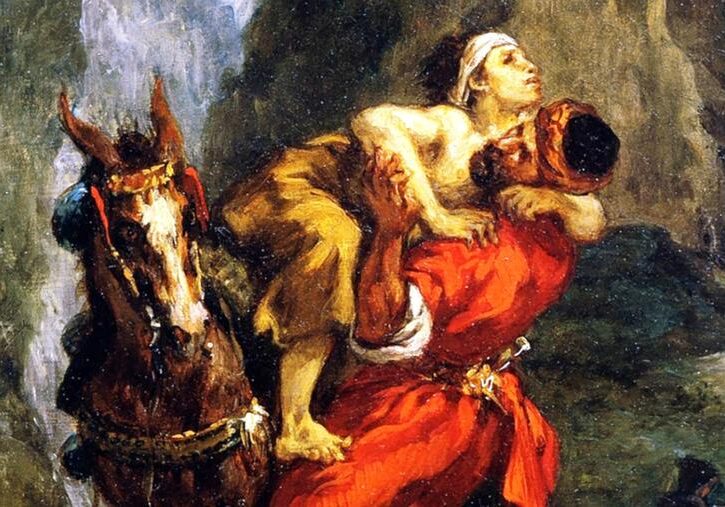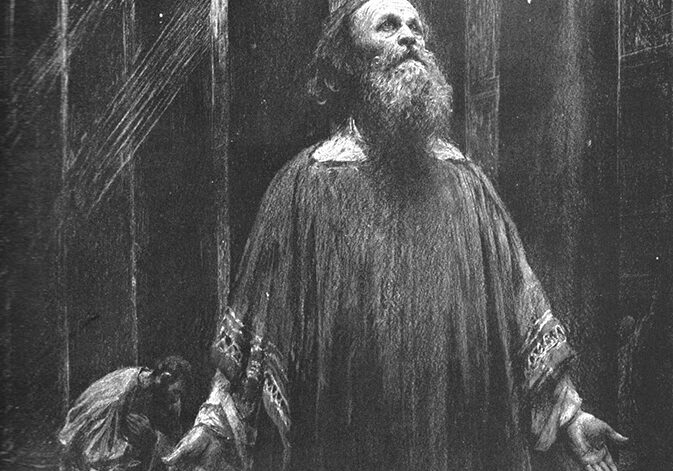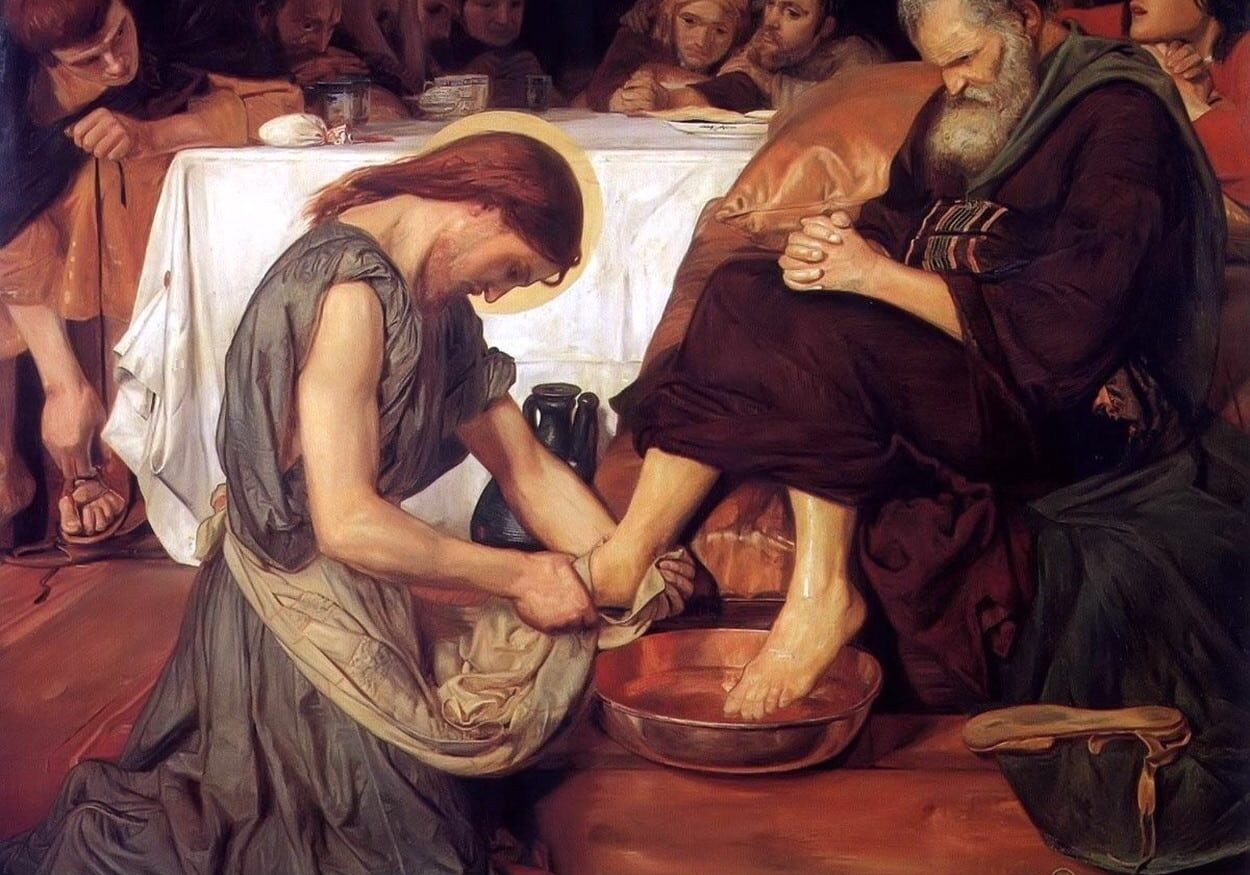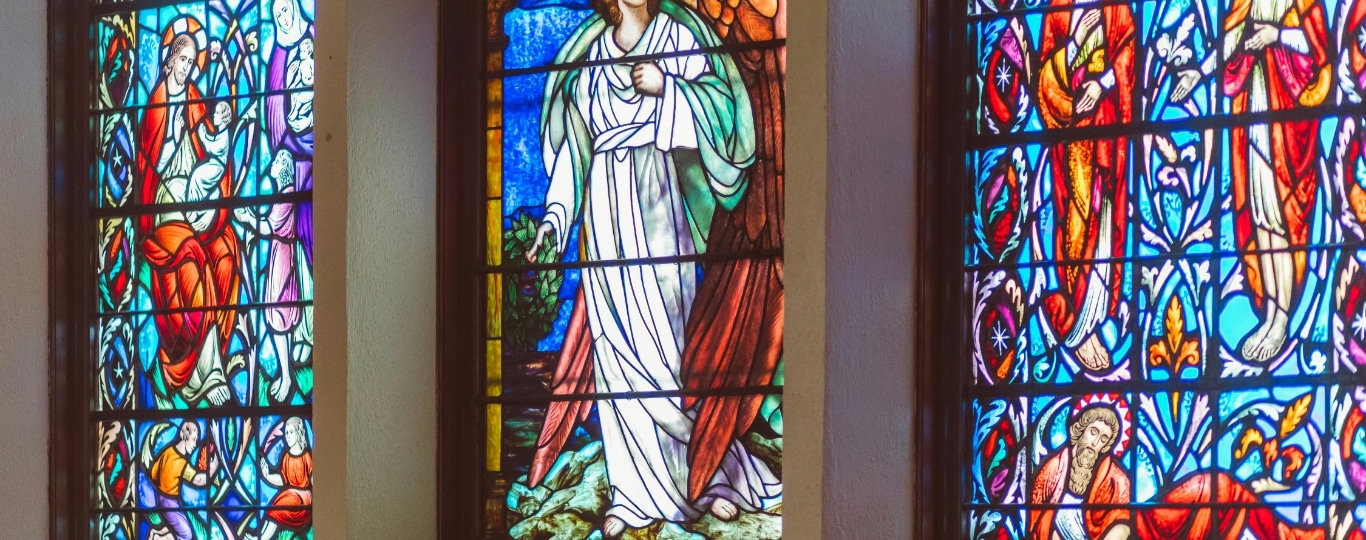†
In JESUS’ parable that we just read from St. Luke 18, we are made to imagine how two men came to the Temple to pray. JESUS’ parable carefully represents the two sociological and religious extremes that the Hebrew nation had to offer: a Pharisee and a tax collector. These men had come to the Temple to pray to GOD, in their own way and after their own hearts’ desires. It is with the content of these men’s prayers that we will find the moral of the parable. — For, JESUS told this parable, the Scriptures say, because there were some among His followers who trusted in themselves that they were righteous and without sin before GOD, like other men. — Yes, it is true, JESUS and His movement attracted all sorts of people – some “holy” people and some “unholy” people. In both cases, the heart of GOD was not clearly understood, so JESUS sought to make the Father’s desire for humility and His resistance to pride known.
In His parable, the two men went in together, through the entrance of the Temple, but no farther did the Pharisee and the Publican go with one another within GOD’s sacred enclosure. For it would seem that before GOD, when he crossed the threshold from the mortal world into the Holy Presence of eternity on earth, mankind would come without prejudices, either against himself or his neighbor. Yet, together, until they entered the Temple and moved each to their own space to pray, the two men’s hearts and prejudices could not be distinguished. Then the Pharisee put himself by himself and prayed thus: ‘Oh GOD, I thank you that I am not as the rest of men – extortioners, unjust adulterers, nor also as this publican there.’
It is hard to express in words, the hubristic nature of many of the religious in Israel when GOD walked on the earth among men in the Person of JESUS Christ. Yet, in the Pharisee, we have epitomized for us this nationalistic arrogance in a special way. Those who were Pharisees took on this name purposefully, for it defined the character and nature of their sect – for, the word Pharisee means separated one. The genesis of this sect came after Israel’s return from exile in Babylon during the Second Temple period (ca. 515 BC). And in JESUS’ day, there were about 6,000 Pharisees in Israel. So religiously conceited were the Pharisees, that they “sought for distinction and praise by the observance of external rites and by the outward forms of piety, such as ablutions, fasting, prayers, and almsgiving. They were comparatively negligent of genuine piety, and they prided themselves on their fancied good works.”1 One example of this was how the Pharisees touted their fasting two-days a week: Tuesdays and Thursdays. These happened to be ‘market days’ in Israel, when the country-folks would go to the cities to buy their market goods. On those days, the Pharisees would hold special services in the local synagogues, revealing the symbols of their fasting, just so that they could obtain praise for their piety, while the people hungrily shopped for food.
The opposite extreme, of course, was the publican or tax-collector. These men were also Jews, but they were Jews who conciliated themselves to help the wards of the state (Herod and Rome), by taxing the common people – helping to fill the coffers of those who lorded over Isreal. — They were considered by all in Israel, at worst, unclean dogs on the level of the Samaritan half-breeds. At best, publicans were seen as Jewish traitors who would rather serve the ruling autocracies instead of living in the community of the faithful, obeying the Law, worshipping GOD with a clear conscience, and if needed, begging for bread for lack of work. The publican chose to live, instead, off the sweat of his brother’s labor, being authorized by the state to tax his fellow Jew enough to feed himself and to satisfy Caesar and Herod. — Generally speaking, they were unjust extortioners, but there were a few that were penitent and lowly – unlike most of the Pharisees, who boasted of their righteousness and were neither penitent nor lowly.
The antagonist in JESUS’ parable is the Pharisee, and the protagonist is the Publican or tax-collector, and their characterization in the parable is true to life. Rev’d Alfred Edersheim, a Messianic Jew turned Anglican priest in the last century, records what the most esteemed, second century, Jewish mystic Rabbi Simeon ben Jochai has hubristically said as a Pharisee of Israel: “I have seen the children of the world, which are to come in the Kingdom of GOD, and they are few. If there are even three, I and my son are of their number; if they are only two, I and my son are they. If it be only one, it is me.”2 — This is why the prayer of the Publican in JESUS’ parable is so scandalous to the ears of those in JESUS’ midst, who trusted in themselves that they were righteous and despised others.
No greater contrast could JESUS have portrayed in contemporary society than to have cast a picture of these two men, praying in the Temple together. These two representatives of humanity in Israel were so contrasted, that they were different in their relationship with Israel and her people, different in their confidence and stature before GOD, and different in their shortcomings and sins according to the Law and the traditions of the rabbis.
To make His point clear, JESUS provides us with another distinction between these two men, clearly seen by the prayer offered by the Publican. — The definite article used in the Publican’s, according to the original Greek text, was the definite article ‘the’, not ‘a’, viz., GOD be merciful to me, the sinner! “This definite article is used to indicate that the Publican felt as if he alone were a sinner – nay, the sinner … He does not think of anyone else, while the Pharisee had thought of everyone else. The tax collector had taken a position, not in front of, but behind everyone else, so in contrast to the Pharisee, who had regarded everyone as a sinner but himself, the Publican regarded everyone else righteous compared with himself, ‘the sinner.’ The Pharisee felt no need, and uttered no petition, while the Publican felt only need, and uttered only petition. The one appealed to himself for justice, the other appealed to GOD for mercy.”3
What then is this lesson that JESUS wants to teach us by His parable? — It is about self-righteous exaltation versus voluntary self-humility, and which of the two GOD desires in His people. What does Solomon, the wisest mortal man, say in his Proverbs about pride and humility? — “A man’s pride shall bring him low: but honor shall uphold the humble in spirit … Pride goeth before destruction, and a haughty spirit before a fall. Better to be of a humble spirit with the lowly, than to divide the spoil with the proud” (Proverbs 29.23; 16.18-19).
The wisdom of Solomon was played out in the life of Solomon’s mother and father and was certainly the case study for his proverbial utterings on the subject. King David, Solomon’s father, was guilty of murder and adultery, and yet, when convicted of his sin, righteously by the prophet Nathaniel, David responded: “I acknowledge my transgressions, and my sin is always before me. Against You, You only O GOD, have I sinned and done this evil in Your sight” (Psalm 51.3-4). — David had committed adultery with the wife of one of his commanders and then had that commander killed in battle as part of a diabolical plan. The pride of David caused the death of many, and he was brought very low for it.
His crime had immediate and long-term political and relational repercussions, yet David knew his sin was ultimately against the GOD of Heaven, who created all things and holds all things together by His power and might. — David’s pride brought him low, and when GOD confronted David through the words of Nathan, who said, “I anointed you king over Israel, and I delivered you from the hand of Saul. I gave you your master’s house and your master’s wives into your keeping and gave you the house of Israel and Judah. And if that had been too little, I also would have given you much more! Why have you despised the commandment of the LORD, to do evil in His sight? You have killed Uriah the Hittite with the sword; you have taken his wife Bathsheba to be your wife and have killed him with the sword of the people of Ammon” (2 Samuel 12.7-9).
And how did David respond? — ‘I thank you, LORD, that I am not like Uriah the Hittite, over there, but instead, I fast two times a week and I give tithes of all that I possess, etc., etc…’ — He did not. Instead, with a lowly and humble spirit, David responded to GOD’s just and true allegations by confessing: “I have sinned against the LORD … Against Him, Him only, have I sinned, and done this evil in His sight: that He mightest be justified when He speakest, and clear when He judgest” (2 Samuel 12.13 & Psalm 51.4).
The model that Christ gives us when we trust in ourselves, that we are righteous, and we despise others for their lack of godly character, is clear. We are to be like the Publican and not like the Pharisee. We are to be like David after he was confronted by the Prophet Nathan. For as we see in these two examples, GOD desires humble penitence and not prideful pageantry. Observe what determined whether the prayer of either of these men was answered or not? — For JESUS said only one man went home with his prayer answered. — He said about the Publican, “This man went down to his house justified rather than the other” (St. Luke 18.14).
In both cases, what decides the acceptance or rejection of the prayer is, whether or not, it was a prayer. “The Pharisee retained his self-righteousness before GOD, which he had claimed for himself, whatever its value. [For JESUS did not blame him for giving thanks to GOD, nor for doing good deeds, real or imaginary.] On the other hand, the Publican received the righteousness which he requested: both received what they desired before GOD … The one appealed to himself for justice – the other appealed to GOD for mercy … In other words, the sentence of righteousness as from GOD with which the Publican went home, was above and far better than the sentence of righteousness pronounced by himself, with which the Pharisee returned home.”4
A clearer lesson on justification by faith in the grace of GOD, lest anyone boast, is not better explained in Holy Scripture than possibly here. The parable also casts greater clarity upon the parable of the Lost Sons that we read and discussed on the Ninth Sunday in Trinity. It also helps us to unravel the confusing statement that JESUS utters to His disciples in the Sermon on the Mount: “For I say to you, that unless your righteousness exceeds the righteousness of the scribes and Pharisees, you will by no means enter the Kingdom of Heaven” (St. Matthew 5.20). For the humble and penitential prayer of the worst Publican atones for his sin, far above and over the proud acclamations of the holiest and most righteous Pharisee. — For JESUS concludes, that “everyone who exalts himself will be humbled, and he who humbles himself will be exalted” (St. Luke 18.14).
Brothers and sisters of St. Mark the Evangelist, let us seek the heart and attitude of the penitential Publican. Let us not find ourselves righteous in and of ourselves, for we cannot boast – the grace of the forgiveness of GOD comes by faith and not by works. Let us remember Solomon’s wisdom, that ‘it is far better to be of a humble spirit with the lowly, than to divide the spoil with the proud.’ For he who will exalt himself will be humbled, and he who humbles himself will be exalted.
O GOD, who declarest Thy almighty power, chiefly in showing mercy and pity to the humble and the meek that seek Thy righteousness; Mercifully grant unto us here at St. Mark’s, such a measure of Thy grace through our trust in Thee, that our sins might be atoned for through the justifying Blood of Thy Son. And so being justified in Him, we may run in the way of Thy commandments, and obtain Thy gracious promises, and be made partakers of Thy heavenly treasure, even eternal life, both now and ever; Amen.
1 BibleHub.org, “Lexical review of the word Pharisee.” Accessed 27 August 2025. https://biblehub.com/greek/5330.htm.
2 Edersheim, Rev’d Dr. Alfred, The Life and Times of JESUS the Messiah, (Peabody: Hendrickson Publishers, 2016), 372.
3-4 Edersheim, 677.
Join Us for Biblical Worship, Study, & Fellowship
Sundays:
Morning Prayer 9:45 am
Coffee & Catechesis 10:30 am
Holy Communion 12:00 pm
Thursdays:
Holy Communion 6:00 pm
Recent Sermons




